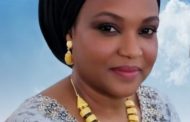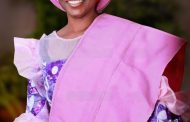By Adagbo Onoja
Although he carries a swagger stick, a signifying practice communicating authority or mystique in much of Africa, he doesn’t accept that he is an elder statesman yet. But he is steadily moving in that direction. It cannot but be so for him who cut his teeth as a reporter with Drum magazine. Remember Drum, the Nigerian outreach of a South Africa based publishing enterprise which was a sensation in those days until a pictorial indiscretion sealed its fate in Nigeria. Unfortunately, it was after the picture had contributed to Nigeria’s most painful post-independence violence. Interestingly, it is emerging that the stuff was not written in Nigeria at all but outside, similar to the false broadcast somewhere near Nigeria which also contributed triggering the Nigerian Civil War. Without subscribing to the domestic/external binary, Nigeria needs to pay better attention to the ‘binoculars of the outside world’ in understanding how it is thrown into turbulence now and then. But that is a matter for another day.
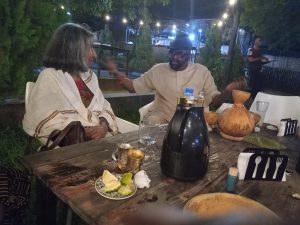
Olaoye explaining a point in one of the shots in which only Dr Chermaine is visible
This evening on August 22nd, 2025 was to mark Olaoye’s birthday. The birthday had to be marked because, for three days running, Olaoye and his invited circle had been in the emotionally challenging task of bidding Prof Okello Oculi final farewell. The evening thus had to be, first, to begin to come to grips with the conspicuous absence of Prof Oculi from among us at the physical level and two, to continue to demonstrate solidarity with his Pan-Africanist criterion for doing things, particularly that he has been a common friend of all gathered at the table – the celebrant, Prof Jibrin Ibrahim, Dr Chermaine Pereira, Cde John Odah, ace broadcaster Mani Onumonu and his wife and this reporter. It was the sort of event Prof Okello would have cherished witnessing, excited as he was about Olaoye ’s pedigree as a student union president of Great Ife in the years of NUNS (National Union of Nigerian Students). Prof Oculi explains the significance of the palm wine that served as the official drink of the night. Okello would have been in extravagant approval of that, food security being the subject of his highly acclaimed doctoral thesis.
Journalism is the first draft of History. That was one of the sort of things bandied about in some journalism schools and newsrooms sometimes back. That sort of claim would no longer pass without contestation anymore in the age when postmodernists (especially the feminists) broke down the centre, decentered everything and made journalists of everyone else on Facebook, Tik Tok and what have you. But it still makes a lot of sense. Journalism still deals with big events, big people, big things, big places – presidents, wars, influential people or great guys or stars, big money, metropoles and shows and what have you.
It was the time journalism was essentially about big stuff that Wole Olaoye was an active professional. He no longer is. When he was, it was fire on the mountain. He doesn’t belong to the first generation of journalists, the ones who, along with mosquitoes, terrorized colonial impostors. He doesn’t also belong to the generation recruited and groomed in adversary journalism that metamorphosed into ‘guerrilla journalism’ in the 1990s. He belongs in the generation of graduate journalists although he had become a journalist and learnt it as a craft before he entered the University of Ife, now known as Obafemi Awolowo University, Ile-Ife. As a cross between the ‘journalism as craft’ generation and ‘journalism as interpretivism’ generation, he packs a lot about who, what, where, when and how of the years under reference.
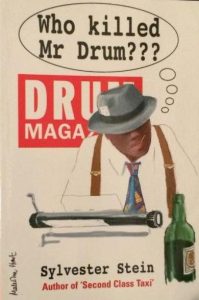 So, Wole’s was not a routine birthday. It was a birthday to pay homage to the living, the dead, to culture, to journalism, activism and gender balancing. I didn’t ask him and I disqualify myself from guessing how old he might be now but it is what anybody can guess from the sketches above. For instance, he worked with Drum. Drum, Spear and Newbreed were the staples in magazine journalism in those days. That was before the ‘junk journalism’ or what Chom Bagu called ‘peeping Tom’ journalism stepped in in the 1980s with salacious human interest stories which mostly dispensed with consent and confidentiality. It is the reason Chom degraded that genre of journalism by giving it the name ‘peeping Tom’ journalism – journalism based on information obtained by peeping into people’s private lives.
So, Wole’s was not a routine birthday. It was a birthday to pay homage to the living, the dead, to culture, to journalism, activism and gender balancing. I didn’t ask him and I disqualify myself from guessing how old he might be now but it is what anybody can guess from the sketches above. For instance, he worked with Drum. Drum, Spear and Newbreed were the staples in magazine journalism in those days. That was before the ‘junk journalism’ or what Chom Bagu called ‘peeping Tom’ journalism stepped in in the 1980s with salacious human interest stories which mostly dispensed with consent and confidentiality. It is the reason Chom degraded that genre of journalism by giving it the name ‘peeping Tom’ journalism – journalism based on information obtained by peeping into people’s private lives.
Now, it is Prof Jibrin Ibrahim who knows about Drum, its days in Nigeria and the disaster that befell it. It is not that he had shares in it or any other interests. He knows it as a researcher in the political economy of Mass Communications, an area he wrote a conference paper in the 1980s and which we should keep pressuring him to rework and publish. He is referenced here for his more academically insightful excavations on Drum from the point of view of our great friend whose birthday we were summoned to mark this night – Wole Olaoye.
As already indicated, Olaoye does not accept being categorised as an elder statesman yet. He is still cruising though not at that altitude when he was a Drum journalist before getting into radical student union activism, returning to journalism here and there before going into business. All these have made him a repository of great encounters. He must not be allowed to escape writing down much of these so that the past can shape the future.
Interacting with Olaoye this evening taught a genealogical lesson: whoever we hear about today cannot be divorced from a certain family or regime of practice or some specific advantageous exposure in the past. In other words, things do not just happen. This does not mean that one is endorsing linearity but that most of these young men who, for example, have made stunning success of music from Nigeria today – Burna Boy, Davido, Asake, and so on, are mostly creations of what contemporary social analysts would call the social ecology. Most of them have roots in the social ecology of Lagos – nightlife, active expressionism, spaces of argumentation and experimentation or links with show promoters, concert promoters, event organisers, campaigners for all manner of causes and the protest culture.
Professor Sam Oyovbaire has a slightly different version of this analysis in his 2002 paper at the National Institute for Policy and Strategic Studies (NIPSS). There is a session of the paper titled ‘media and democracy’ where he asserted that a typical Lagos-based journalist assumes a Lagos country mentality, irrespective of his or her own place of origin. The Lagos newsroom has a way of turning its intellectuals and practitioners into visualising Nigeria from that geography. This is not necessarily negative or exclusionary of competing alternatives. It is just that it is dominant.
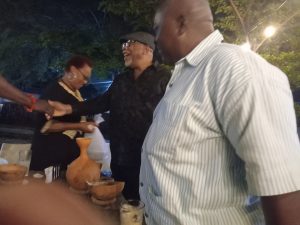
When Mani Onumonu was taking his leave
The dinner table wandered into what the generation of Olaoye and Jibrin Ibrahim had done to the subsequent generations. In the late 1970s and 1980s, the quality of food served undergraduates was completely elitist. By the theology of progress woven by Enlightenment modernism, the quality of food should even be better by now. But what do we get? Undergraduates now enter the university to struggle for a 3 – in – 1 degree: struggle with accommodation; struggle with feeding and struggling with academics. They end up so exhausted that they come out empty handed. And the country pretends that it is making progress even though these future leaders have been given the least preparations to compete in the world ahead. The belief out there is that it is not that Nigeria doesn’t have the money to fund education. It is that those who have pocketed Nigeria have, in deference to their colonial godfathers, decided that education is not a priority. Only in Nigeria. However, this was not a critique of Olaoye or Prof Ibrahim but a critique of the system through the duo as those available to be reprimanded.
The retired broadcaster and Cde John Odah were the only two exempted from this reprimand because, by the time Odah entered the university in 1979, the cost of feeding a day had risen from 500 Naira in Olaoye’s days to thrice that amount. And Odah made a career of fighting commodification of university education through the National Association of Nigerian Students (NANS). Of significance here is that, on that table, all four of the fighting generations since the 1970s were present and from four different universities across Nigeria: Ife; Zaria where Prof Jibo transitioned from a radical student to an eaglet lecturer following the vacuum created with the sudden departure of expatriates in the early 1980s; UNIJOS and BUK.
It was not all concern with the dangerous direction Nigeria is heading. There was happiness in some of us getting to meet broadcaster Mani Onumonu at last. When he was an active broadcaster, his voice, more than the news, was the attraction to the national network. There were others like him such as Abdulmalik Addy and his producer, Nyaka Mindapha who was succeeded by late Isa Edime in Radio Kaduna just as there was Shola Omole on NTA. But beyond the voice, Mani Onumonu speaks to the plenitude of subjective variables available for mobilisation for making a greater Nigeria possible. An Easterner born somewhere in the Northeast, who lived much of his life in Lagos in the Southwest and related to the Southsouth by marriage embody the sort of subjective stuff that nation building could profit from, except in Nigeria.
Of course, the table listened to not a few of Olaoye’s experiences in trouble making. Once he opened his mouth too wide about missing $2. 8b of Nigerian money in the early 1980s. For that, he was hauled before the courts and only one other ‘professor’ in the trouble making industry taught him the tricks of a safe landing from such entrapment.
The way to conclude this is to reference the consensus of the table that Wole should write his biography. Journalists will need it. Mass Communication teachers would need it just as cultural researchers and political theorists would. The night closed with a motion for adjournment moved by Prof Ibrahim and seconded by Dr Chermaine Peirera. As the two had become the majority in the event of Mani and his wife’s departure, the ‘Ayes’ easily had it. But it was a great, reflective evening. Next week is for one other trouble maker!





